On 14 October 2025, the European Commission announced that it had imposed fines of over €157 million on luxury fashion houses Gucci, Chloé, and Loewe for preventing independent retailers from freely setting the resale prices of their branded products. This type of conduct, known as resale price maintenance (RPM), is treated as a ‘hardcore’ restriction of competition as it typically leads to higher prices and less choice for consumers.
Like the Commission’s decisions against four consumer electronics manufacturers in 2018, the heavy fines imposed on Gucci, Chloé, and Loewe illustrate that RPM continues to carry a high level of antitrust enforcement risk. “In Europe, all consumers, whatever they buy, and wherever they buy it, online or offline, deserve the benefits of genuine price competition,” European Commissioner for Competition Teresa Ribera said.
The Commission launched its investigation into Gucci, Chloé, and Loewe following unannounced inspections at their respective premises in April 2023. The investigation revealed that the three luxury brands imposed restrictions on retailers for both online and in-store sales, preventing them from freely setting prices across the entire range of goods sold under these brands. In the luxury goods sector, pricing restrictions of this nature are often applied to preserve a sense of exclusivity and premium positioning.
Anticompetitive measures
Specifically, the three fashion houses were found to have breached competition law by asking retailers to:
- stick to recommended retail prices;
- avoid discounting above specific amounts; and
- restrict sales periods to specific times.
In some instances, the three fashion companies stopped retailers from offering any discounts altogether. Gucci also prevented its retailers from selling one of its product categories online.
To ensure compliance with their policies, the three fashion companies actively monitored the retailers’ prices and followed up with ‘non-compliant’ retailers. The retailers generally obeyed the fashion companies’ pricing policies, either from the start or after being requested to do so. The practices reduced price competition between the independent retailers and the fashion companies’ own retail outlets.
Key takeaways
- The decisions send a strong message that RPM will not be tolerated under EU competition law, regardless of whether it happens online or on the high street. Companies should therefore ensure that they do not restrict retailers’ pricing freedom: while oversight of retailers and maximum resale prices are permissible, suppliers must avoid measures that enforce fixed or minimum resale prices or otherwise limit retailers’ freedom to discount.
- The case suggests that the temptation to engage in RPM can be particularly strong in a “dual distribution” context – i.e. where the supplier is also active at the downstream retail level, in competition with independent retailers. Competition compliance measures should be tailored accordingly in circumstances where the supplier does not just have a “vertical” relationship with its retailers but is also competing with them at the retail level.
- The decisions highlight that in circumstances where the competition authority’s case is strong, early and meaningful cooperation with the authority can pay off. The Commission reduced the fines for two parties by 50% for their proactive cooperation during the investigation. This cooperation took various forms, including expressly acknowledging infringement of the competition rules and providing further evidence with “significant added value” at an early stage of the investigation.

/Passle/5f3d6e345354880e28b1fb63/MediaLibrary/Images/2025-09-29-13-48-10-128-68da8e1af6347a2c4b96de4e.png)
/Passle/5f3d6e345354880e28b1fb63/MediaLibrary/Images/2025-07-10-13-52-35-189-686fc5a39f23a993118ba1a0.png)
/Passle/5f3d6e345354880e28b1fb63/SearchServiceImages/2026-02-20-09-54-03-745-69982f3bff07facd13d88f69.jpg)
/Passle/5f3d6e345354880e28b1fb63/SearchServiceImages/2026-02-18-09-25-14-317-6995857a406a38553e720e5d.jpg)